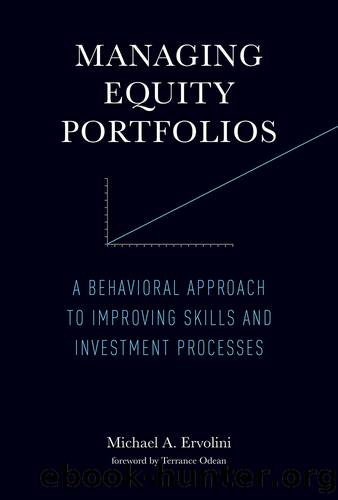Managing Equity Portfolios by Michael A. Ervolini

Author:Michael A. Ervolini [Ervolini, Michael A.]
Language: eng
Format: epub
Tags: business, economics, finance, equity, portfolios, investing
ISBN: 9780262028349
Publisher: The MIT Press
Published: 2014-07-14T16:00:00+00:00
17 Regrettable Choices
It isn’t the burdens of today that drive men mad, but rather the regret over yesterday and the fear of tomorrow.
Robert J. Hastings, “The Station,” Baptist Press, July 5, 1988
Equity investing requires the ability to price uncertainty. But at what emotional costs? Having to live with a poor outcome or the knowledge of a missed opportunity makes even the best of us want to kick ourselves. This essay examines how, if left unchecked, these feelings influence investment decisions in unintended ways.
Coulda, Woulda, Shoulda
Regret is the emotion we experience when confronted by a mistake, especially one for which we feel responsible or can easily imagine better options. Regret springs from poor results and foregone opportunities. The consequences can be severe, as in the case of the man who killed himself when, after years of playing a number in the lottery, he neglected to renew his multi-week ticket and missed the winning draw for 2 million pounds.
Thankfully, regret is not usually fatal. But it does cause pain—the sort of psychic pain that etches vivid memories into our brain. Avoiding such feelings again in the future then becomes a powerful motivator for decisions we make, a process called “regret aversion.”
Small Gains and Large Losses
Regret aversion is one of the chief motivations behind the disposition effect. Formulated by Hersh Shefrin and Meir Statman, the disposition effect suggests that, when liquidity is needed, investors are more likely, or “disposed,” to sell their winners and hold on to their losers.1 Since the disposition effect is an extension of prospect theory, the motivations associated with it are commonly attributed to risk aversion with gains (taking profits quickly) and risk seeking with losses (preferring to ride them out in hope of eventually breaking even).
Yet Shefrin and Statman identified regret aversion as a fundamental motivator for the disposition effect. In this view, selling winners quickly reflects the desire to avoid the regret of having a stock run up in price through today only to watch it come all the way back down tomorrow—round-tripping. Similarly, holding on to losing positions can be an aversion to the regret associated with feeling like a loser once a “paper loss” is realized. Avoiding painful or unpleasant feelings is a universal defense mechanism. Understanding one’s tendency to experience regret aversion can help in making the right risk/return tradeoffs.
Not Adding Up
Investors are more likely to add to or make incremental investments in portfolio positions that are down rather than up, according to analyses performed by Cabot. This behavior is at odds with the time-honored adage, “Starve your losers and feed your winners.” It is, however, consistent with what we know about prospect theory, which suggests investors tend to be more risk seeking with losses and risk averse with gains.
Not adding to winners is also explained by regret aversion. In his paper “Are Investors Reluctant to Sell Their Losses?,” Terrance Odean suggests that not buying more of a portfolio winner may reflect the manager’s regret over not having purchased more of it initially.
Download
This site does not store any files on its server. We only index and link to content provided by other sites. Please contact the content providers to delete copyright contents if any and email us, we'll remove relevant links or contents immediately.
| Analysis & Strategy | Bonds |
| Commodities | Derivatives |
| Futures | Introduction |
| Mutual Funds | Online Trading |
| Options | Portfolio Management |
| Real Estate | Stocks |
Pioneering Portfolio Management by David F. Swensen(5606)
Rich Dad Poor Dad by Robert T. Kiyosaki(5150)
How To Win Friends and Influence People by Dale Carnegie(3772)
The Money Culture by Michael Lewis(3284)
The Dhandho Investor by Mohnish Pabrai(3169)
The Wisdom of Finance by Mihir Desai(3079)
Liar's Poker by Michael Lewis(2812)
The Intelligent Investor by Benjamin Graham Jason Zweig(2598)
The ONE Thing by Gary Keller(2519)
Mastering Bitcoin: Programming the Open Blockchain by Andreas M. Antonopoulos(2512)
Investing For Dummies by Eric Tyson(2472)
How to Day Trade for a Living: Tools, Tactics, Money Management, Discipline and Trading Psychology by Andrew Aziz(2446)
How to Win Friends and Influence People by Dale Carnegie(2435)
Rich Dad Poor Dad: What The Rich Teach Their Kids About Money - That The Poor And Middle Class Do Not! by Robert T. Kiyosaki(2434)
Fooled by Randomness: The Hidden Role of Chance in Life and in the Markets by Nassim Nicholas Taleb(2413)
Zero Hour by Harry S. Dent Jr. & Andrew Pancholi(2246)
Market Wizards by Jack D. Schwager(2164)
Rich Dad's Guide to Investing by Robert T. Kiyosaki(2111)
How to Pay Zero Taxes, 2018 by Jeff A. Schnepper(2100)
